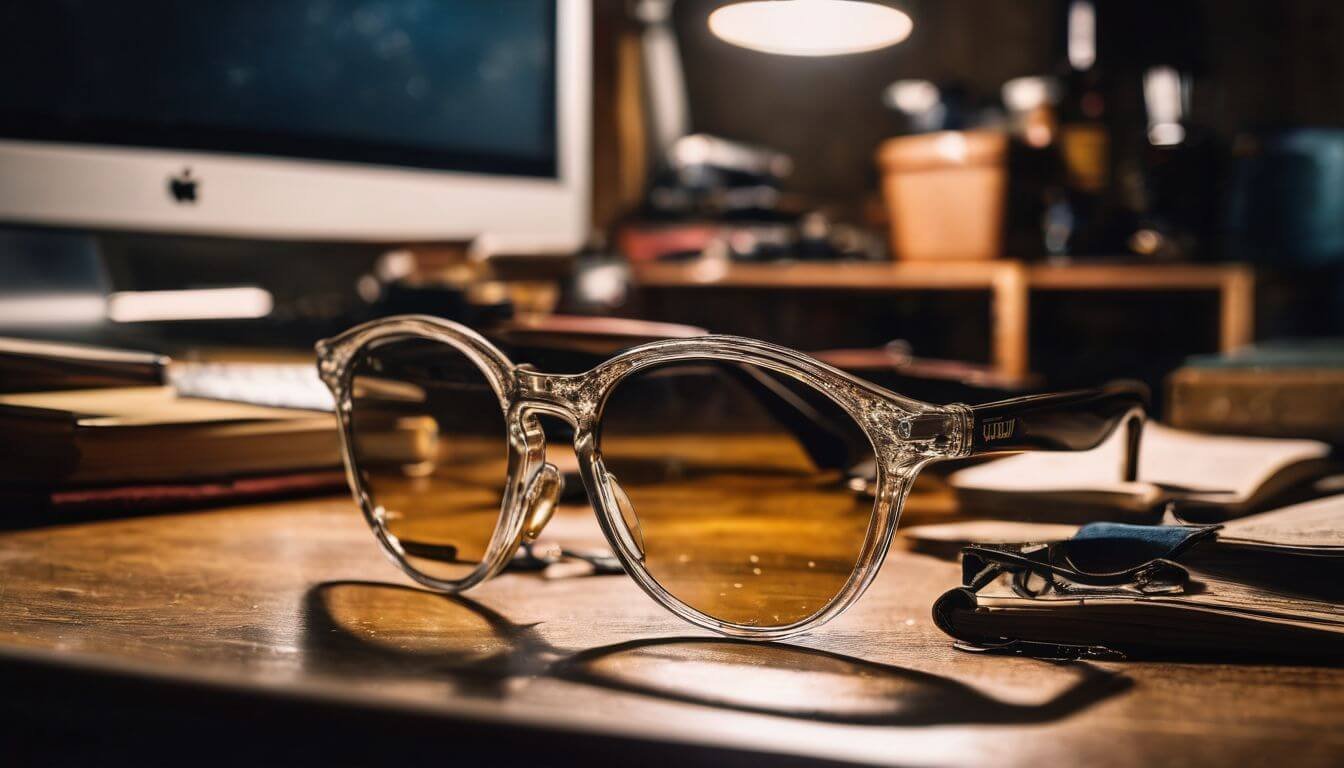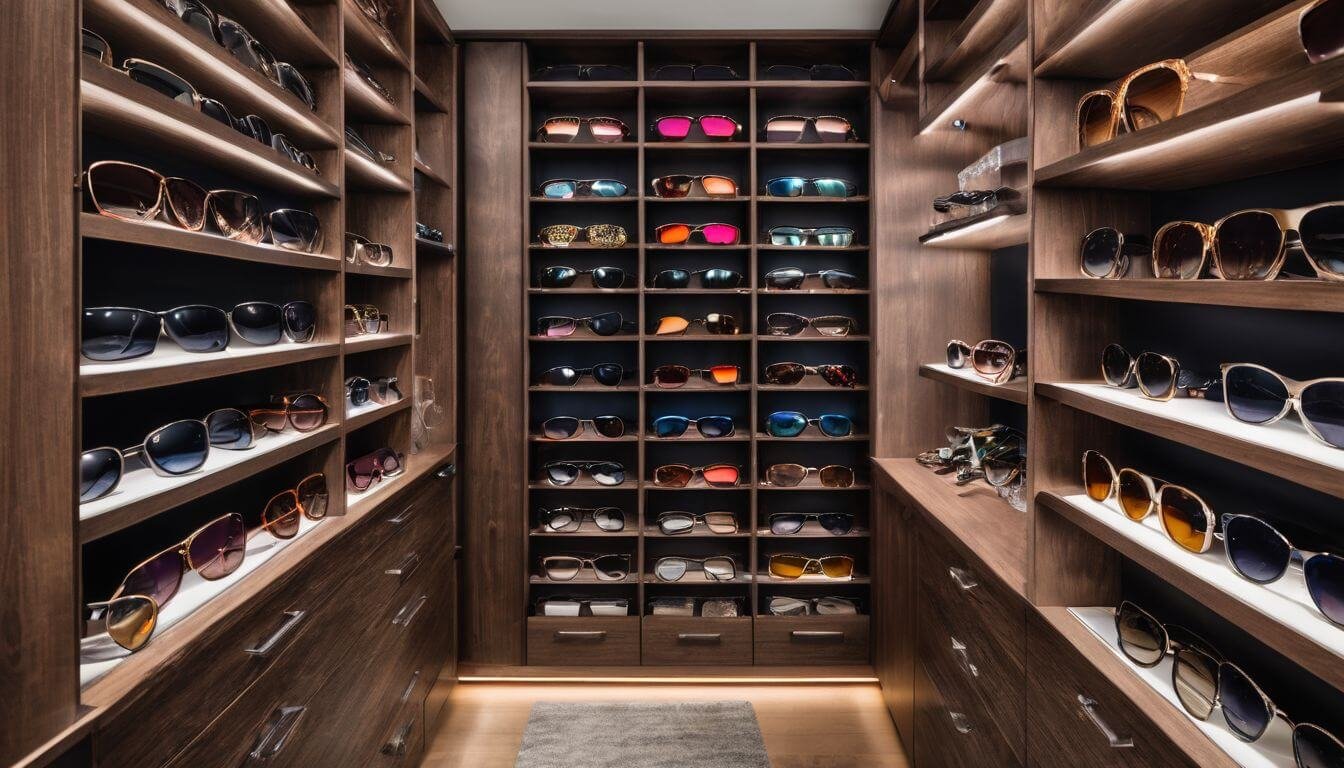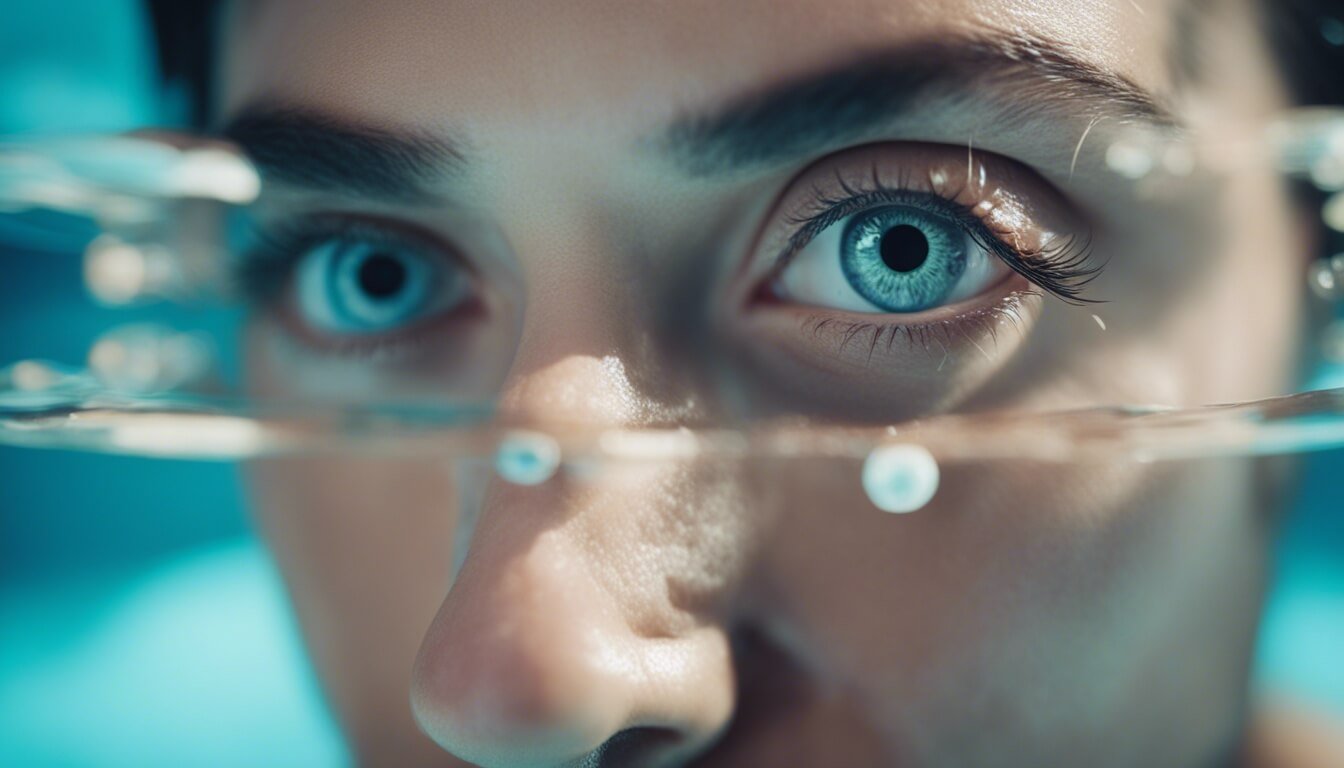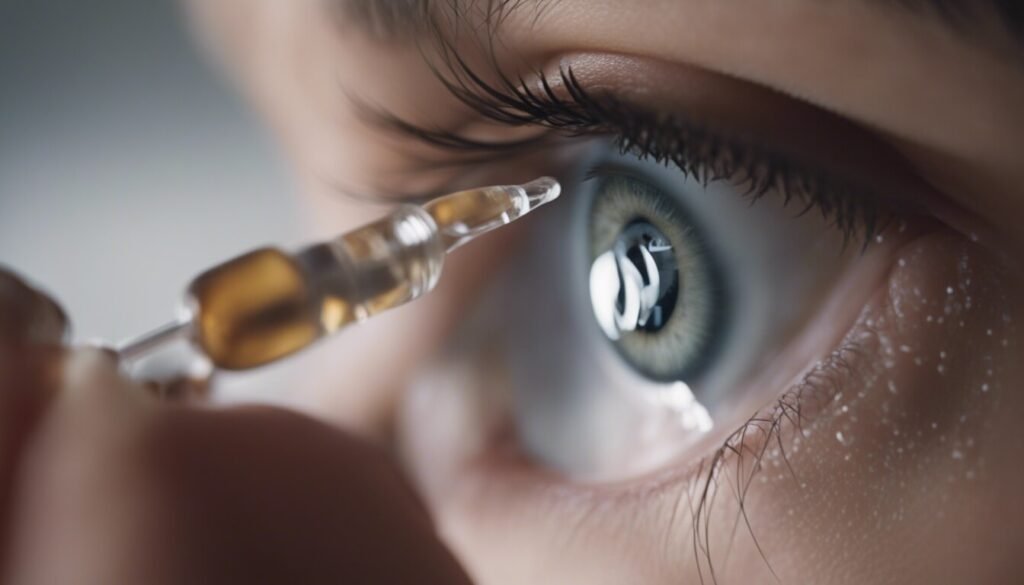
the Ultimate Eye Care Routine
Does it feel like your eyes are always tired, no matter how much sleep you get? You’re not alone; our peepers work overtime in the digital world we live in. Good news: simple daily habits can make a huge difference for those delicate orbs! Stick with me – I’ve got the ultimate eye care routine that’ll have your eyes sparkling like never before.
Get ready to wink at the mirror and say, “Hello, brightness!”.

Key Takeaways
- Eat foods rich in vitamins and omega-3 fatty acids to keep your eyes healthy. Drink lots of water too.
- Protect your eyes by wearing sunglasses outside and taking screen breaks every 20 minutes when using digital devices.
- Get regular eye exams, even if you think your vision is fine, to catch any problems early.
- Sleep well every night to help prevent puffy bags and dark circles under your eyes.
- Be gentle when applying makeup around the eyes, use clean hands and tools, and always remove it before bedtime.
Understanding the importance of a daily eye care routine
Taking care of your eyes every day is key to keeping them bright and healthy. Just like brushing your teeth, a daily eye care routine helps fight off problems before they start. You wouldn’t skip out on washing your face, right? Well, the skin around your eyes needs that same kind of love! Small steps can make a big difference—like eating foods that are good for your eyes.
Think bright colors on your plate; we’re talking veggies and fruits packed with vitamins. And hey, those sunglasses aren’t just a cool fashion statement; they block harmful UV rays that can hurt your eyes.
Now let’s talk about screen time because we all know you’re probably glued to one right now (no judgment here). Your peepers get tired from staring at screens all day long—phones, tablets, computers—you name it.
So practice the 20-20-20 rule: Every 20 minutes look at something 20 feet away for 20 seconds. It’s like giving your eye muscles a mini-break so they don’t throw in the towel too early in life! Keep up these simple habits and not only will you feel better but you’ll see clearly why everyday eye care matters so much.
The impact of lifestyle and environmental factors on eye health
You are what you eat, and that goes for your eyes too! Foods loaded with omega-3 fatty acids, lutein, zinc, vitamins C and E help keep your peepers sparkling. Think more fish on the plate, leafy greens like spinach, and fruits full of color.
These good eats can fight off age-related eye problems, help in reducing fine lines and dark circles, and sharpen your sight.
Now don’t forget to give those eyes a break from the harsh sun! Sunglasses aren’t just a fashion statement; they shield your delicate eye skin from UV rays that can harm vision over time.
And it’s not only about sunny days—windy weather or dry office air also mess with eye comfort. Wear sunglasses when you step out and use a humidifier indoors if needed to protect those windows to the soul.
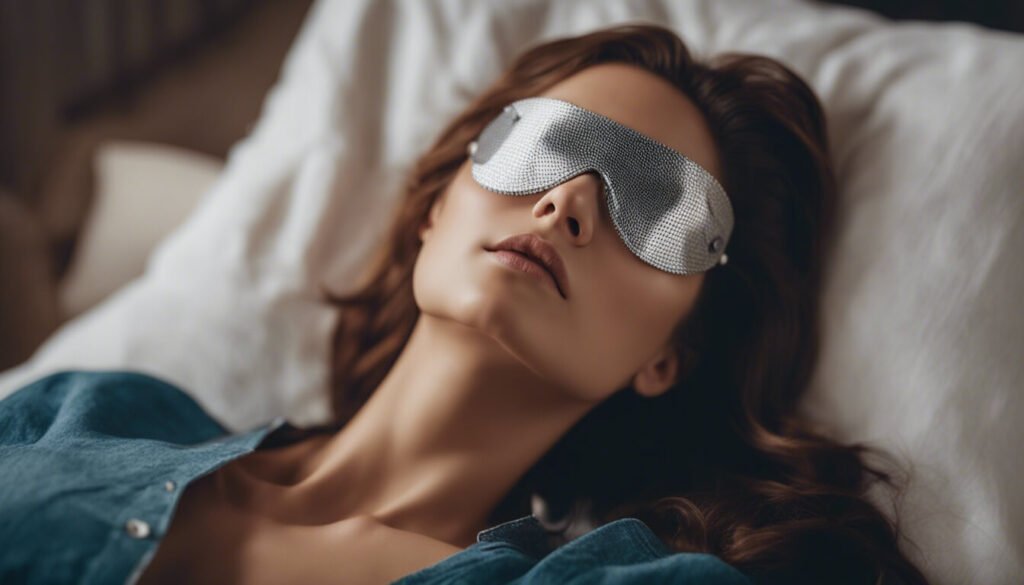
Essential Steps for Daily Eye Care
Keep your eyes bright and happy with some simple steps every day. Eat foods that are good for your eyes—like ones rich in omega-3 fatty acids, lutein, and vitamins C and E. These nutrients help keep your vision sharp and your eyes healthy.
Drink plenty of water to stay hydrated; it’s great for the whole body, including those peepers! Make sure you’re getting enough sleep each night to prevent dark circles.
Protect those eyes from the sun’s rays with a good pair of sunglasses when you step outside. They’ll block out harmful UV light that can damage your sight over time. And hey, they look cool too! Also, give yourself breaks from staring at screens all day to avoid strain on your eye muscles.
Look away every 20 minutes or so—stare at something far away to let your eye muscles relax a bit.
Routine eye care means keeping up with regular check-ups too. Those visits can catch problems early before they get bigger (and trust me; you want them caught early). Plus, exercise gets blood flowing—which is just as helpful for eyes as it is for muscles! So take care of those windows to the world; they do a lot for you!
Hydration and Nutrition for Eye Health
Eating the right stuff can make your eyes shine like stars. Don’t forget to drink plenty of water too; it’s like a secret potion for bright peepers.
- Grab some oranges or squeeze a bit of lemon into your water. These fruits are loaded with vitamin C, which heroes up against eye problems.
- Snack on nuts and seeds when you’re feeling munchy. They’ve got omega-3s and vitamin E, keeping your eyes like a well-oiled machine.
- Carrots aren’t just for bunnies – they’ve got loads of vitamin A and beta-carotene, which are ace for seeing in the dark.
- Love your greens, especially spinach and kale. They’re packed with lutein and zeaxanthin – fancy names for must-haves in the eye health game.
- Salmon’s not just tasty; it’s filled with omega-3 fatty acids that help prevent dry eyes. So yeah, fish is a smart choice!
- Eggs aren’t only great for breakfast. Their yolks have nutrients that can fight off some mean eye diseases.
- Chug down water all day long – not just when you’re thirsty! Staying hydrated helps kick away dryness and keeps everything moist.
- Lean meats like chicken or beef are friends to your eyes too. Zinc in these foods gives a high-five to your sight.
Importance of Sunglasses for Eye Protection
Sunglasses are more than just a fashion statement – they’re vital for shielding your eyes. They help keep your vision sharp and eyes healthy.
- Block harmful UV rays: Wearing sunglasses cuts down on the sun’s ultraviolet radiation that can harm your eyesight.
- Protect against eye problems: You’re less likely to get cataracts or macular degeneration if you wear shades often.
- Keep your skin safe: The delicate skin around the eyes stays protected from sun damage, which can lead to wrinkles and cancer.
- Cut down glare: Bright sunlight can be blinding, but sunglasses make it easier to see on sunny days.
- Prevent dry-eye issues: Windy conditions make eyes dry out. Sunglasses keep them moist by blocking the wind.
- Avoid injuries: When playing sports or doing outdoor activities, sunglasses guard your eyes from dust and debris.
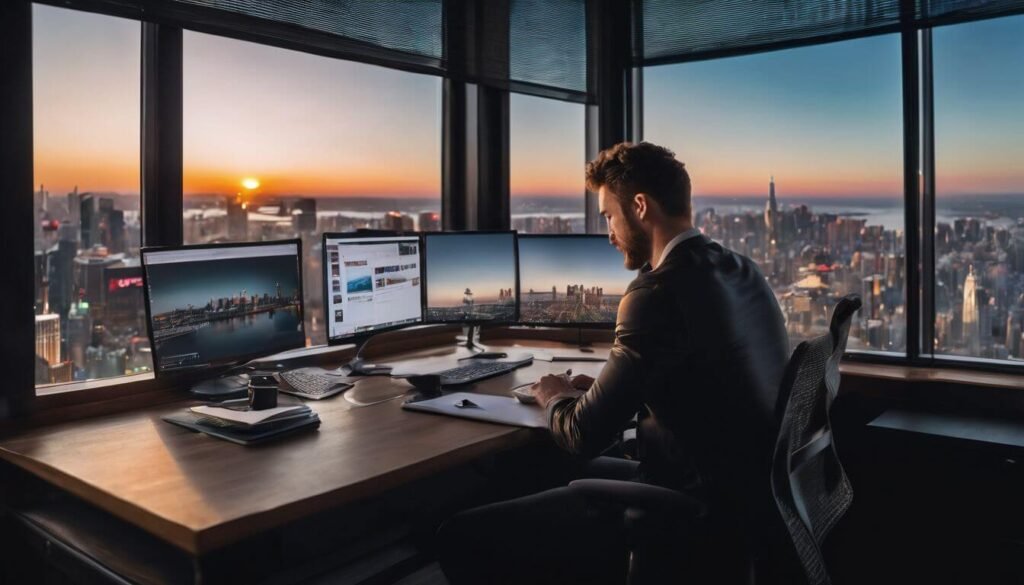
Managing Screen Time and Digital Eye Strain
Let’s talk about cutting down on screen time to save those peepers! Staring at phones, tablets, and computers can really make your eyes tired. A simple fix? Take breaks often. Try the 20-20-20 rule – look away every 20 minutes at something 20 feet away for 20 seconds.
Your workspace matters too, so set up your screen right. It should be one arm’s length away with the top just below eye level. And don’t forget to blink – it keeps your eyes from getting dry and cranky.
Trust me, they’ll thank you by staying bright and healthy!
Reducing Screen Time Impact
Screens are everywhere, and they can tire out your eyes. Giving your eyes a break from screens can make them feel better. Here’s what you should do:
- Set a timer to remind you to look away from the screen every 20 minutes. Find something far away to focus on for 20 seconds.
- Lower the brightness on your devices. Bright screens can be hard on your eyes, especially in dark rooms.
- Make text bigger on screens so you don’t have to squint. This helps you read easily without straining your eyes.
- Keep screens at arm’s length and tilt them slightly below eye level. This position is easier on your eyes than having the screen too close or too high.
- Use apps that filter out blue light, or wear glasses with a blue light filter. This light can mess with sleep and make eyes tired.
- Don’t use screens in bed right before sleep. Your body, and especially your eyes, need time to wind down without bright lights for mitigating the risk of dry skin.
- Take breaks during long periods of using screens. Stand up, stretch, and let your eyes rest for a bit.
- Adjust room lighting when using screens so there isn’t a big difference between the screen and surroundings. Your eyes work harder if it’s really dark around a bright screen.
- Make sure you blink often while looking at screens to keep your eyes moist and happy.
Ergonomic Screen Setup
Staring at a screen all day can tire your eyes. An ergonomic screen setup can help keep them fresh.
- Place your monitor about an arm’s length away. This distance is just right to see everything without straining.
- Set the top of your screen level with your eyes. You won’t have to tilt your head up or down; it’ll be comfy for your neck too, especially important if you recently had lasik eye surgery!
- Choose a chair that supports your back and lets you sit up straight. Good posture means less stress on your eyes.
- Fix the lighting in the room to cut glare on the screen. Soft, indirect light works best to reduce harsh reflections.
- Take breaks every 20 minutes using the 20-20-20 rule: Look at something 20 feet away for 20 seconds every 20 minutes.
- Adjust text size and contrast so you don’t squint. Bigger, clearer words are easier on your eyes.
- Keep blinking! It sounds simple, but it keeps eyes moist and reduces dryness and irritation.
- Use an anti – glare screen if needed. It can really ease the strain from bright screens.
- Tweak the angle of your monitor to avoid reflections from lights or windows. A little tilt could mean less glare.
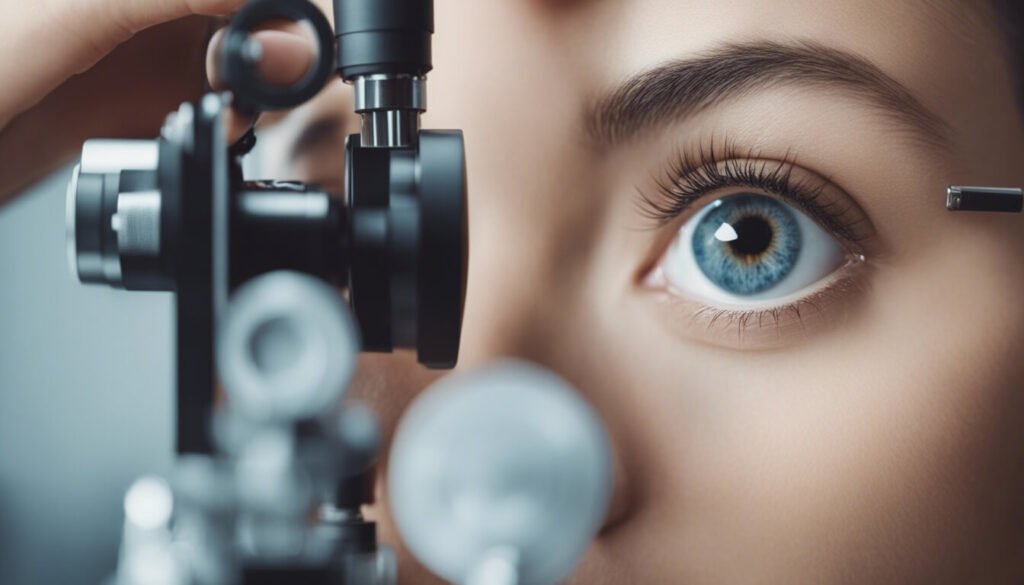
Regular Eye Examinations
Getting your eyes checked regularly is a must-do for keeping them healthy. You might feel just fine, but eye exams can catch problems early, when they’re easier to treat. Experts say you should go for an eye exam every one to two years.
Don’t wait until things look blurry or you have trouble seeing at night.
Kids need eye checks too; it helps them do their best in school and play. Even if you don’t need glasses or new prescriptions, eye doctors can spot signs of other health issues—like diabetes or high blood pressure—just by looking into your eyes.
So mark the calendar, make that call, and get those peepers checked!
Scheduling Routine Eye Check-Ups
Going to the eye doctor regularly is key for keeping your eyes bright and healthy. It helps you catch any eye problems early, when they’re easier to treat.
- Make a plan to visit the eye doctor once a year. This yearly check-up can help find issues like glaucoma or cataracts before they get worse.
- If you wear glasses or contacts, you might need to go more often. Your vision can change, so it’s best to keep it in check.
- Keep track of any changes in how well you see. Tell your eye doctor if you start having trouble reading signs or if lights start to look too bright.
- Write down any eye problems your family has had. Some eye troubles run in families, and your doctor should know about them.
- Take note if your eyes often feel dry, red, or tired. These could be signs that something’s not right with your eyes.
- Before you leave the doctor’s office, always set up your next appointment. This way, you won’t forget when it’s time to go back.
- Ask questions while at the eye clinic. If there’s stuff about your eyes or vision that puzzles you, now’s the chance to get answers.

Exercise and Eye Health
Exercise isn’t just for muscles and heart health. Getting your body moving can also help your eyes. Think about it — when you’re active, blood pumps around your whole body. This includes your eyes! More blood flow means more oxygen and nutrients to keep your eyes working well.
Staying fit might even lower the risk of eye problems like cataracts and age-related macular degeneration. And guess what? Working out could help with those annoying dry eyes too! It seems sweat and hard work do more than just make you look good; they give a hand in keeping those peepers healthy.
So lace up those sneakers, because every step counts for eye care!
Benefits of Physical Activity for Eyes
Being active is great for your whole body, including your eyes. Moving more can really help keep your eyes healthy.
- Get your heart pumping! Exercise increases blood flow, which improves oxygen levels to your eyes and the rest of your body.
- Say goodbye to puffy eyes. Being active helps reduce fluid retention that can cause swelling around our eyes.
- Feel the burn? Not in your eyes! Regular exercise can cut down on dryness and irritation that lead to discomfort.
- Lower stress means healthier eyes. Working out calms stress and that’s good news for eye strain and vision health.
- Protect against harmful light. Outdoor activities mean more sun exposure, so wear sunglasses to shield your peepers from UV rays.
- Fight off sleepiness for brighter eyes. Physical activity can lead to better sleep, giving you less dark circles under those twinkling stars of yours.
- Turn back the clock on aging signs. Keep fine lines and wrinkles at bay with exercises that increase blood circulation, making skin around our peeper pals firmer.
- Boost eye protection power by strengthening immunity. A fit body often leads to a strong immune system, which is a pal to our precious eye area!
- Wave ‘see ya’ to screen time woes. More playtime outdoors helps balance the many hours we spend staring at screens.
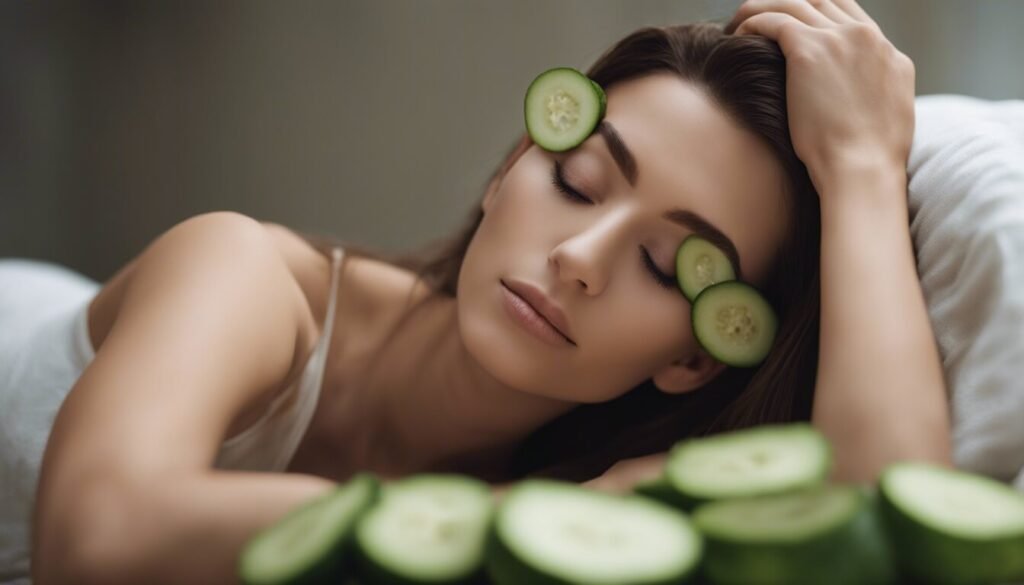
Eye Hygiene and Makeup Practices
Keep your eyes happy by staying clean and safe with makeup. Always wash your hands before you touch your eyes. This keeps germs away. When putting on or taking off makeup, be gentle around the eye area.
The skin there is very thin and needs care.
Make sure to use fresh makeup. Old mascara or eyeliner can have bacteria that hurts your eyes. Take off all eye makeup before you sleep to help prevent infections and keep oil glands clear.
Use a good remover so you don’t have to rub too hard.
Safe Eye Makeup Application and Removal
Putting on makeup around your eyes can make you look great. Taking it off the right way is just as important to keep your eyes healthy. Here’s how to protect your skin and eyes using the right daytime routine, while also doing both safely:
- Wash your hands before you touch your face or start applying makeup. This keeps germs away from your sensitive eye area.
- Use quality products that are kind to your skin. Look for items labeled “hypoallergenic” or “for sensitive skin.”
- Check expiration dates on all eye makeup. Old products can have bacteria that hurt your eyes.
- Apply makeup gently without pulling or stretching the skin around your eyes. This helps prevent wrinkles and damage.
- Keep sharp pencils, like eyeliner, clean and well-shaped to avoid scratching your eye.
- Sharing isn’t caring in this case—never share eye makeup with others. It spreads germs that can cause infection.
- Each night, take time to remove eye makeup completely. Leaving it on can cause dryness or pimples, particularly if your dry skin around the eyes is prone to inflammation.
- Use a soft, gentle remover designed for the eyes; some have ingredients like hyaluronic acid that are good for the skin.
- Soak a cotton pad with remover and press lightly on the lid for a few seconds so the makeup comes off easily.
- Swipe softly – no hard rubbing – towards the outer corner of your eye, this helps to clear mascara and eyeliner without causing harm to the under-eye area.
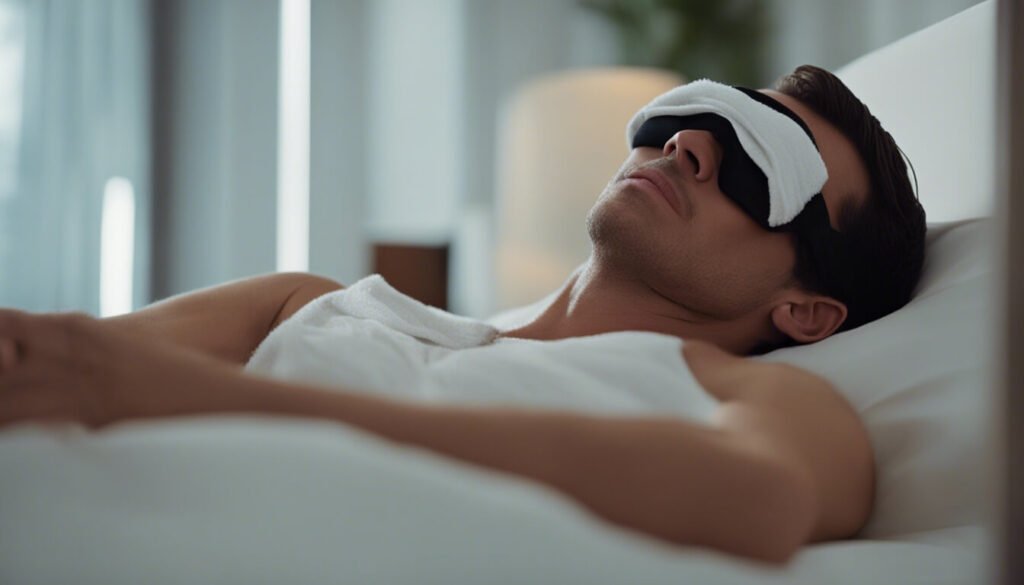
The Impact of Sleep on Eye Health
Sleep does wonders for your peepers. Think of it like a mini spa for your eyes. Every night, when you catch those z’s, you’re actually giving your eyes the time they need to rest and repair from the day’s work.
Not enough shut-eye? That could lead to puffy bags, dark circles under your eyes, and even dryness.
Getting seven to nine hours of sleep every night is key for bright, happy eyes. Your body uses this time to heal all parts — including around your eyes. Good sleep can help fight off redness and make sure those beautiful windows to the soul stay sparkling.
So slip into dreamland and let nighttime work its magic on keeping your vision clear and skin around the eyes smooth!
Sleep and Eye Health
Getting good sleep is like hitting a reset button for your eyes. During the night, they get a break and can heal from the day’s work. You know that tired, gritty feeling when you don’t catch enough Zs? Your eyes hate it too! Lack of sleep makes them red, puffy, and more likely to get dry or even cause vision trouble.
So make sure you’re getting plenty of shut-eye every night—it helps keep those peepers bright and healthy. While snoozing, your body pumps blood to the skin around your eyes; this can cut down on puffiness and dark circles.
Aim for 7-9 hours each night to help fight off those pesky signs of aging and under-eye bags. Trust me, your morning eye will thank you!
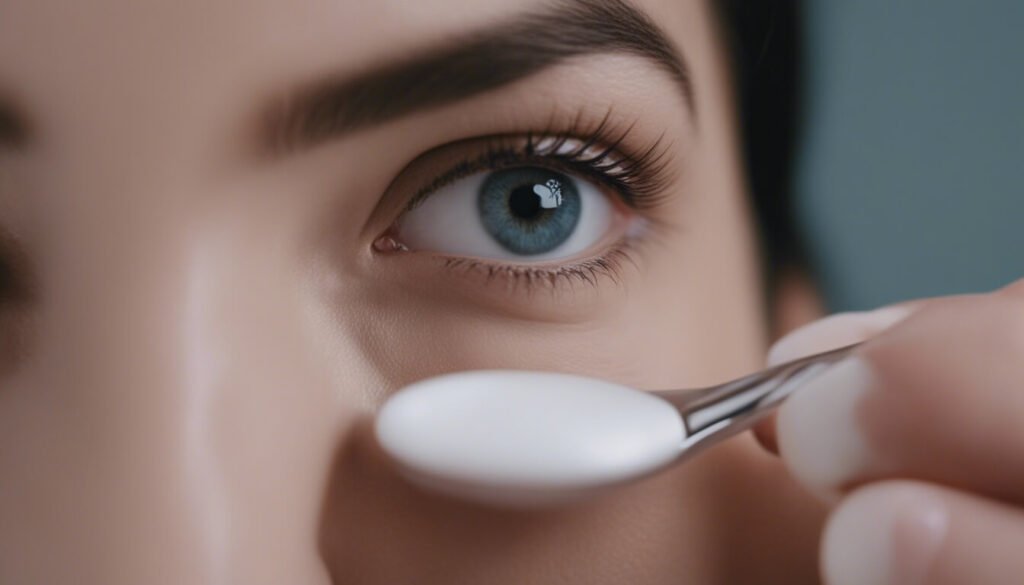
Additional Eye Care Tips
Moisturizing is a game changer for keeping the skin around your eyes soft and smooth. Look for eye creams with hyaluronic acid to lock in that moisture. Sunscreen isn’t just for beach days—it’s a daily must to fight off sneaky UV rays that cause aging.
Whenever you put things near your eyes, play it safe! Use gentle pats instead of rubbing; this way you show love to those delicate areas without being rough.
Eye drops can work wonders if your peepers get red or irritated (but hey, not all eye drops are created equal). Make sure yours have the good stuff and avoid ones with harsh chemicals.
Take these tips seriously, but don’t forget—caring for those windows to your soul should feel nice and easy, like Sunday mornings and warm pancakes.
Moisturizing and Sun Protection
Keeping the skin around your eyes hydrated helps prevent dryness and fine lines. Sun protection is key to stopping damage and keeping your eyes healthy.
- Use a nourishing eye cream every day. Choose one with hydrating ingredients like hyaluronic acid.
- Always put on sunscreen. Go for SPF 30 or higher to shield the skin from harmful rays.
- Wear sunglasses that block UV rays. This protects both your eyes and the tender skin around them.
- Drink lots of water throughout the day. It keeps your skin hydrated from the inside out.
- Eat foods full of vitamin A, such as carrots and sweet potatoes. They help keep your eye area bright.
- Put on a wide-brimmed hat along with sunglasses for extra shade when you’re outdoors.
- Check your eye creams for antioxidants like vitamin C. They fight free radicals that can harm the skin.
Gentle Application Techniques
Taking care of the skin around your eyes is key. With gentle application techniques, you can protect this delicate area.
- Pat, don’t rub: The skin under your eyes is super thin and sensitive. Use your ring finger to lightly tap in products. This way, less pressure is put on your skin.
- Use special eye creams: Pick creams made just for the eye area. They have the right stuff to firm the eye and keep it moist without being too harsh.
- Clean hands are a must: Always wash your hands before touching your eyes to avoid dirt and germs.
- Cool it down: To reduce puffiness, use cool tea bags or cucumber slices. Lay back and rest them on your closed eyes for a few minutes.
- Be careful with makeup: When putting on or taking off makeup near your eyes, go slow and be gentle to not harm the skin.
- Mind the order: Apply thinner products first and follow up with thicker ones like creams or oils. This helps everything soak in better.
- Ditch old makeup: Throw away old eye makeup after a few months to prevent infections or irritation from bacteria build-up.

Frequently Asked Questions (FAQ)
Q: What is an eye care routine?
A: An eye care routine refers to the regular practices and products used to maintain the health and appearance of the skin around the eyes. It typically involves using eye cream, hydration to prevent wrinkles and dark circles, and reducing puffiness. A good skincare routine for the area around the eyes can help nourish and protect the delicate skin.
Q: How can I improve my eye care routine?
A: To enhance your eye care routine, consider incorporating a serum with collagen to improve skin elasticity and reduce puffiness. Additionally, using products containing hyaluronic acid and regularly applying sunscreen to protect from UV rays can help hydrate and nourish the skin around your eyes.
Q: What are the common problems of the skin around the eyes?
A: The skin around your eyes is delicate and prone to issues such as wrinkles, dark circles, puffy eyes, and dryness. Factors like aging, lack of sleep, and exposure to environmental stressors can contribute to these concerns. A consistent care routine and the use of suitable eye creams can help address and prevent these problems.
Q: What is the best way to care for the skin around my eyes?
A: It’s important to take good care of the skin around your eyes, as it is prone to premature aging and other issues. Using a gentle eye cream and being gentle when applying products around your eyes is one way to help protect this delicate area.
Q: Why is it important to take good care of the skin around my eyes?
A: The skin around our eyes is one of the most delicate areas of the skin on our face and is prone to issues such as fine lines, dark circles, and puffiness. Therefore, it’s essential to maintain a good eye care routine to help improve and maintain the skin’s natural health.
Q: What are some common eye problems that I should be aware of?
A: Some common eye problems include dry eyes and headaches, bags under the eyes, swollen eyes, and red eyes. It’s important to be aware of these issues and seek professional advice if you experience any persistent symptoms.
Q: How can I protect my eyes during the daytime?
A: Protect your eyes during the daytime by lowering your screen time, wearing UV-protective sunglasses, and taking regular breaks from prolonged periods of screen use. These practices help promote good eye health and reduce the strain on your eyes.
Q: What should be a part of my everyday eye care routine?
A: Your everyday eye care routine should include using a gentle eye cream, being mindful of lowering your screen time, and ensuring that your overall skin care routine includes proper care for the skin around your eyes.
Q: How can I improve my skin health around my eyes?
A: To help improve the skin health around your eyes, make sure to keep the area moisturized, protect it from UV rays, and use products designed specifically for the delicate skin around the eyes. Additionally, ensuring that you stay hydrated and get adequate sleep can also have a positive impact.
Q: Is it essential to know my eye health better?
A: Yes, knowing your eye health better is crucial for maintaining good vision and overall eye well-being. Regular eye exams and being aware of any changes in your vision or eye comfort are essential for early detection and treatment of potential issues.
Q: What are the benefits of using eye cream?
A: Eye creams can help reduce the appearance of fine lines, dark circles, and puffiness around your eyes. They can also provide essential hydration and nourishment to the delicate skin around the eyes, helping to prevent premature aging.
Q: Can my screen time affect the skin around my eyes?
A: Yes, excessive screen time can contribute to strain and fatigue in the eyes, which can in turn impact the skin around your eyes. Lowering your screen time and following good eye care practices can help mitigate these effects.
Q: When should I consider an eye exam?
A: It’s important to consider an eye exam if you experience any changes in your vision, discomfort in your eyes, or if you haven’t had an eye exam in over a year. Regular eye exams are important for maintaining good eye health and catching any issues early on.



